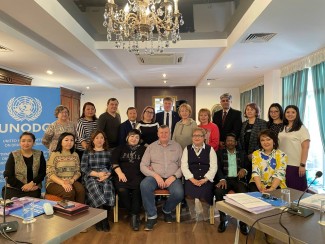UNODC Trains Team of National Trainers from Central Asia within the Advanced Level of the Universal Treatment Curriculum for Substance Use Disorders

The UNODC Regional Office for Central Asia supported a training of trainers (ToT) on Course 13 – “Contingency Management: A Reinforcement Based Treatment” and “Course 18 – “Clinical Supervision” which took place in person in Bishkek, Kyrgyzstan on 10-18 March 2022. These courses are part of the Advanced Level of the Universal Treatment Curriculum for Substance Use Disorders (UTC training package).
The training was organized within the framework of UNODC global project GLOJ71 “Treating drug dependence and its health consequences: Treatnet” in collaboration with Sub-programme 3: Addressing drug problems, increasing treatment of drug use disorders and preventing HIV/AIDS” of the UNODC Programme for Central Asia for 2022-2025 and Prevention, Treatment and Rehabilitation Section, UNODC HQ with financial support from U.S. Department of State’s Bureau of International Narcotics and Law Enforcement Affairs.
“As we continue to strengthen our efforts to make our communities and populations safer from the adverse consequences associated with drug use, it is imperative to invest in evidence-based interventions that are effective, and socio-culturally acceptable. Contingency Management has been recommended as one such important approach that can be used to strengthen the services being offered to the persons who use drugs and their care givers. Additionally, addiction professionals, service providers and administrators shall also benefit immensely from the introduction of clinical supervision in the treatment centers. The trainees from this workshop are expected to contribute to the capacity building initiatives across the Central Asia as national and regional trainers” said Mr. Borikhan Shaumarov, Senior Programme Officer of UNODC ROCA during ceremonial welcome.
The sixteen (16) members of the national team of trainers from Kyrgyzstan, Kazakhstan and Uzbekistan attended the training delivered by the team of UTC Global Master

During the first three days of training, participants had an opportunity to familiarize themselves with the theoretical foundations of contingency management, learn about existing contingency management interventions and develop the skills to apply them in the treatment of substance use disorders.
The remaining five day of the training were focused on clinical supervision issues. The participants enhanced the skills that clinical supervisors will need to positively impact the professional development of addiction specialists and treatment programs for the treatment of substance use disorders.
“I am very glad for the opportunity to participate in the training on Course 13 “Contingency Management: A Reinforcement Based Treatment”. The knowledge and skills received during this training are very useful and adaptable to our working conditions. I am confident that my colleagues with whom I will share the learnt skills will also find them very helpful. The second training “Course 18 – “Clinical Supervision” was a bit challenging for me because there were a lot of moments when the self-evaluation and being honest with yourself were required. During the training we identified on which supervision level we are and learnt the ways how we can upgrade it. There is a lot of work to do in this sphere, however this training served as a good starting point,” said Ms. Gulvera Kalybekova, Psychologist of Department # 3 of Republican Center for Psychiatry and Narcology of the Ministry of Health of the Kyrgyz Republic.
